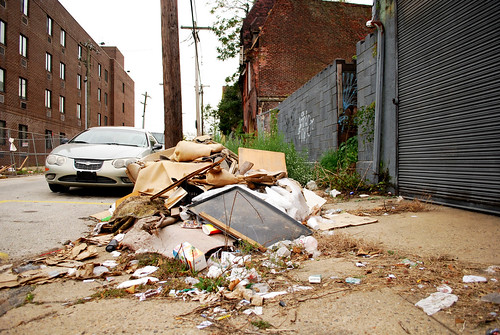
A proposed district seeks to improve safety and cleanliness near Main Campus.
Just two weeks after he introduced a proposal to prevent students from obtaining housing in the area around Main Campus, Councilman Darrell Clarke presented another piece of legislation to help change the landscape of North Central Philadelphia.
A resolution, brought to City Council Oct. 6 by Clarke, seeks to create a “North Central Neighborhood Improvement District,” which would aid neighborhoods by implementing new safety and cleaning measures.
The approach to absolving the community of litter and crime is starkly different from his proposed housing ordinance, which he reportedly introduced by relating Temple students to those seen in frat-comedy “Animal House.”
“We’ve had issues with trash pickup and the overall appearance of streets, so it’s something that the district will help improve the neighborhood,” Beverly Coleman, assistant vice president for community relations and economic development, said.
Coleman has acted as a Temple representative in discussions on the district’s planning.
Peter Crawford, a local developer and member of the executive committee of the Temple Area Property Association, said the services and programs would extend much further into the community than Main Campus borders.
“It’s always been my understanding that..Temple does not have a significant presence further out into the neighborhoods where a lot of students are living,” Crawford said.
Services included in the district would likely include security cameras and safety ambassadors, Crawford said.
“We would like to have something like a North Philly 311 service where people can call in quality of life problems and we can call them into the city and followup to make sure some action is taken,” Crawford said.
To fund the district, the city would primarily charge an assessment fee to property owners in the area. The assessment fee would be determined by a director’s board for the district, but would not exceed 10 percent of real estate taxes, according to a preliminary plan submitted to the city.
Owner-occupied single-family homes would be exempt from the assessment.
“It’s a low-income neighborhood and we don’t have any desire to impose any additional burden on homeowners,” Crawford said.
Temple is also expected to make an annual contribution of an amount that has not yet been announced.
The district’s first year budget is estimated to be $450,000–$200,000 of which is dedicated to sidewalk and street cleaning, according to the preliminary plan.
Crawford said officials involved cannot have a firm grasp on on the budget until Temple announces its contribution.
Coleman said she did not know how much Temple would contribute, or when that number would be announced.
The initial term proposed for the district is five years, during which all improvements and services would be expected to be implemented.
University City has a similar neighborhood improvement district.
Another improvement district in the Chinatown North and Callowhill areas was recently given preliminary approval by City Council, despite opposition by Chinatown residents. The district does not include the same home-owner exemption.
“I don’t anticipate that there will be opposition, because we’re not targeting homeowners to contribute,” Coleman said.
Coleman said she was unsure if the fee charged to property owners would result in rent increases, but Crawford, in a follow-up email, said the “property tax surcharge is modest and I see no effect on rent.”
For Crawford, the creation of an improvement district represents an alternative to Clarke’s proposed housing ordinance, which he previously described as being detrimental to economic growth.
“The councilman has not taken any further action on the housing bill and I am confident that the housing bill will be allowed to die, if the Neighborhood Improvement District is enacted,” Crawford said.
Clarke could not be reached for comment.
A public hearing on the proposed district is scheduled for Dec. 13.
Angelo Fichera can be reached at afichera@temple.edu.



Hey Angelo Fichera, I really hope the 2012 housing and property market is a great deal more suitable as well as that we may find progress by having lending practices as well as even view more desirable modifications on the government side of the equation, I presume this will be actuallywould be an exceptional advantage to all property purchasers, home sellers as well as real estate professionals.
Hey Angelo Fichera, you really made some wonderful points and I enjoyed going through this. I wish you and your loved ones experience a safe as well as delightful holiday and really good health and prosperity in 2012.